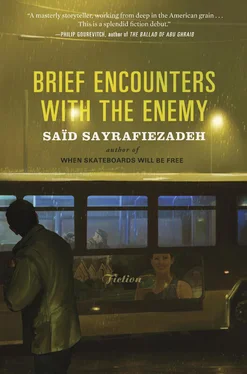At six o’clock I left the store with my spreadsheets and a cup of coffee. “See you tomorrow, Mr. McDonough,” the cashiers called out sycophantically.
A long line of customers was filing in with their shopping carts and their babies and I had to jostle my way to get through. It was chilly outside but getting warmer day by day. It had been a rough winter and now we were hoping for a nice spring. The clocks had just been set ahead and the sunshine was pleasant but disconcerting. It made me feel like the last ten hours spent indoors had been doubly squandered. I drove my car around to the back where the garbage dumpsters stood in a row. No one was around. No one had any business being around. I turned on the radio and drank my coffee and listened to some news about baseball and about the war. I shut it off. Sitting in the silent cocoon of the car, with the sun beginning to go down, familiar fatigue came over me, originating in the soles of my feet and emanating upward until I felt soft and heavy. Even the coffee couldn’t offset the effects. It was warm in the car and I turned on the AC and it blew in my face. I took out my BlackBerry and checked my email. I have a tendency to check my email compulsively, especially when I’m idle. There were four new emails, all from work, all forwarded by people who had cc’d fifty people. It was what you did when you were trying to get out of responsibility, when you wanted to pass the buck to the next guy — you cc’d everyone. “Accounts Payable Protocol” was the subject line of one. I didn’t bother to read any of them.
In my lap lay my spreadsheets, rows and columns of blocks, some of those blocks filled, some of them empty; by tomorrow morning they’d all be filled in by me. They looked like a road map of sorts, my spreadsheets, an aerial view of the city, little block by little block, and I considered the drive I was about to make to Winchester Parks and whether I should take the expressway or the bridge. I thought about Mr. Bildman, and I thought about Mr. Bildman’s daughter, Zlottie. She liked me, but I wasn’t sure if she liked me as more than just a friend . A slight tremble of anxiety passed through me, briefly counterbalancing the fatigue. It had been a while since I’d had a girlfriend, a real girlfriend, mainly because I was shy, but also because I worked all the time and I couldn’t find any girls I liked. But Zlottie was smart, she was also sophisticated, and she had the darkest eyes. She had the darkest hair too. In short, she was the most beautiful girl I’d ever met.
The last time I’d seen her was right before Christmas. I’d gone to the shop with Chip. Chip had the connection and I had the car. He’d brought with him sixteen boxes of underpants that he’d taken off the truck at Kmart. “I don’t give a fuck,” he said. He’d been at Kmart seven years and was about to deploy and had nothing left to lose. He’d lost it all already when he blew out his knee senior year and his basketball scholarship was revoked. He’d shown me the letter the college sent him upon hearing the news, a giant coat of arms telling him they’d be happy to still have him if he could come up with twenty-five thousand dollars a year. He was six-foot-six but walked with a slouch, all shoulders, no neck, as if trying to get back to normal height so he could forget the whole thing. Instead of going to college, he’d signed up for the reserves. When he’d gotten called up, I’d told him, “You’ll be back before you know it.” I’d been one of those fools who thought there wasn’t even going to be a war. Now that’s exactly where he was.
When we’d walked into Mr. Bildman’s shop that final day, Zlottie had been right in the front, standing on a ladder stacking boxes of crackers. On the shelf behind her was one of those Jewish candelabras with half the candles lit. The shop glowed in a soft light, making Zlottie look dramatic on the ladder, like an angel descending. She was wearing the same thing she always wore: a long black skirt that dropped all the way down to her shoes like a curtain on a stage and which hid the good parts from view. Even so, I could make out the curve of her ass. While Chip was in the back sorting out the details with Mr. Bildman, I broke the news that I wouldn’t be coming back. It was Chip’s thing, after all, and I was only the driver, and he was going off to war — and I wasn’t really a thief.
“That’s that,” I said. I tried to sound detached.
“Okay,” she said.
She didn’t seem to be affected by it that much. Apparently I was the only one with feelings. It was dark enough in the store that Zlottie, in her dark outfit, was almost beginning to disappear before my eyes. Then she caught me by surprise by saying, “Well, I’m just glad it’s not you shipping out, Nick.” Her voice sounded poignant in a time of war.
Since then I’d masturbated every day, sometimes twice a day, thinking about her working in that dusty shop, with that long black hair and that long black skirt, me entering with a box of whatnot, and the candles lit romantically.
From around the corner of the loading dock, Joey Joey appeared, pushing a big green dumpster that said WALMART on the side. He looked lethargic. His blue shirt was half untucked and there was sweat under the armpits. His pale face and round head added to the quality of lethargy.
“Oooooh,” he said as I rolled down the window. “I don’t think this is a good idea, Nick.” The teenage humor from earlier was gone. Outside the walls of Walmart, he was all sniffles and submission. That’s what jail had done to him. Eight years in the penitentiary would have turned him into a rabid, raging fiend, but eight months in county jail had sapped his spirit. I felt a pang of remorse for having recruited him in a crime that was for my benefit only. “I’ll make this worth your while,” I said.
I got out of the car, and together we pulled my big box of toilet paper and my other big box out of the dumpster. There was slime on the boxes, grease or something, but they were no worse for the wear. Mr. Bildman would take them.
I chose wrong and took the expressway. It was bumper-to-bumper. Joey Joey passed the time by flipping back and forth through my spreadsheets. I checked my email. It was getting dark out, and my BlackBerry glowed with emails of cc’s. Every few seconds we’d crawl a foot and then stop. All the cars had flags on them, or red-white-and-blue bumper stickers, or some indication that we were in the midst. Occasionally someone would yell out a car window. “Niiiiiiiiiiiiiiick!” they’d yell, or “Joey JoEYYYYYYYYY!” because we’d lived in this city all our lives and we knew everyone.
“I could do this,” Joey Joey said, meaning my spreadsheets, meaning my job.
“Why don’t you, then?” I said.
He guffawed. Then he got quiet while he pondered. “Twenty,” he said, “thirty-three, one-oh-seven.” He pointed with schoolboy pride at the little empty city blocks on the spreadsheet.
“Oh yeah?” I said. “What about the weekend?”
He pondered again. He tallied on his fingers. “Twenty-nine,” he announced, “thirty-four, two-eleven.”
He was right, he probably could do my job. But he wouldn’t. He’d just talk about doing it. He didn’t have that thing anymore, whatever that thing was that got you ahead in life. He’d fallen hard and couldn’t get back up. Maybe he’d never really had that thing . Maybe he was the kind of person who was better at taking orders than giving them. “That boy moves like a coon,” my father once said. He was a boorish man, my father, unschooled and unskilled, pretty much like the rest of the people in my neighborhood. I’m the one who ended up accomplishing something, making something of myself, and now I had to live with everyone thinking that they could do my job, that what I’ve earned is because of some secret to which they don’t have access: ill-gotten gains. The real secret is I worked sixty hours last week, not including the work I took home. The week before I worked seventy. I get full benefits and three weeks’ vacation, but I’ve done the math, and when it’s all added up, my salary isn’t much above minimum wage. About the only thing that separates me from the associates is that I wear a white shirt instead of a blue one. Often I’ll fantasize about when times were simple and I carried a box cutter and waited around for someone to tell me what to do. Other times I fantasize about moving up to upper management, which is at least ten years away if things go right. In ten years I’ll be thirty-six. I’ll have a potbelly and I’ll be bald. I’ll look like the district manager who drives a yellow Mercedes with a license plate that says WLMRT-1. He says to me, “I was just like you once, Nick.” He wants to keep me motivated.
Читать дальше












